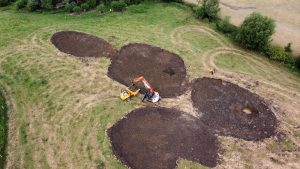Freshwater wildlife to benefit from floodplain restoration in Buckinghamshire
3rd October 2022
Wildlife is set to benefit from a major floodplain restoration project, which could bring back rare and endangered wetland plants and animals to a farm in Buckinghamshire.
Freshwater Habitats Trust and River Thame Conservation Trust have joined forces with farmer Rose Dale to create new freshwater and wetland habitats on her 220-acre organic farm in Chearsley, near Aylesbury. Work has begun on the site to create a ‘floodplain wetland mosaic’ habitat, which will include 15 new seasonal and permanent ponds and a backwater channel connected to the River Thame.
The development is part of Freshwater Habitats Trust’s Building Oxfordshire’s Freshwater Network project, which is funded through the Government’s Green Recovery Challenge Fund.
Co-hosts of the River Thame Catchment Partnership, Freshwater Habitats Trust and River Thame Conservation Trust are restoring floodplains to help reverse the decline of freshwater wildlife and contributing to the creation of the Freshwater Network in Oxfordshire and Buckinghamshire. Creating this network will enable freshwater plants and animals to more easily disperse across the landscape and provide resilience to climate change and other environmental pressures.
At Manor Farm, the team has developed a complex of clean, unpolluted, freshwater ponds and shallow pools, creating habitats which are now rare in lowland England. Each new waterbody has a long ‘drawdown zone’ – the area which gradually dries out through the summer. This marshy habitat is the most diverse part of the ponds and supports water plants like Small Pondweed and Spiked Water-milfoil and invertebrates like the Common Darter dragonfly and the Black-bellied Diving Beetle as well as larger animals, including otters and wading birds.
The development also features a backwater, a shallow channel connected to the main river, which will provide shelter and nursery grounds for fish.
Because the ponds hold clean, unpolluted water, they will be allow species that have disappeared from large parts of England, because of water pollution, to spread back into the Thame catchment. These include sensitive plants like Lesser Water-plantain and Water-violet.
The development will also provide benefits for the farm, including drinking water and more green forage for cattle during dry weather, Also, by ‘roughening up’ the floodplain, the team hopes to hold more water back on the floodplain when the river is in flood.
Freshwater Habitats Trust is also investigating the possibility of reintroducing rare water and wetland plants, which were once widespread on Buckinghamshire’s floodplains, to the site.
Hannah Worker of Freshwater Habitats Trust said: “It’s great to be on site and collaborating with the River Thame Conservation Trust and Rose to develop these new, high quality freshwater and wetland habitats at Manor Farm. We’re aiming to bring back species that would once have flourished here but have been entirely lost, as well as providing a range of habitats for local wildlife.
“The drought this summer highlighted the importance of having waterbodies in the landscape. Our own research has shown that increasingly the number of clean water ponds provides resilience against drought and boosts freshwater biodiversity across whole landscape. We also know that these small waterbodies can support a rich diversity of plant and animal species.
“Freshwater Habitats Trust has identified Manor Farm as being in an Important Freshwater Area. These are the places we are focusing on as we develop the Freshwater Network – a national network of wilder, cleaner, connected freshwaters. Restoring the floodplains at Manor Farm is one of our very first steps in this vital strategy, which aims to reverse the long decline of freshwater wildlife.”
 New ponds have been created at Manor Farm as part of a wetland mosaic habitat.
New ponds have been created at Manor Farm as part of a wetland mosaic habitat.
Hilary Phillips, Senior Project Officer with the River Thame Conservation Trust said: “As part of our Engaging with Farmers project we facilitate the Thame Valley Farmer Cluster, working with farmers to help them protect and enhance water, soil, and air on the land they manage. We take a holistic approach to advising our farmers on water and habitat management. We link them up with opportunities to build sustainable businesses alongside thriving ecosystems.
“Rose Dale, a member of the cluster, farms on an important connecting corridor of the River Thame and recognises the importance of water for farm sustainability. She has advocated strongly for the protection of soils and water. We are delighted to be working on this shared vision with Rose in collaboration with our partners at Freshwater Habitats Trust.
“This wetland habitat mosaic is one in a series of planned floodplain enhancements radiating out from our first wetland project at Eythrope. This will benefit the environment, businesses, and the local community as well as increasing the area’s biodiversity.”
Bordered by the River Thame and one of its tributaries, Chearsley Brook, Manor Farm has been in Rose Dale’s family since 1969. Rose seeks to farm regeneratively, rearing pasture-fed beef and lamb.
She said: “I’m a custodian of this lovely piece of land for just a short time so it’s important to protect it. Despite the many difficulties and stresses associated with farming, I want to go on to create a sustainable future for the farm.
“If I think back to my youth, or discuss it with my parents, it’s clear that we’ve lost a great deal of biodiversity in a short space of time and I want to nurture what’s there and try to improve it. The wetland project is a wonderful way to restore this landscape to a flourishing natural state. Since converting to an organic farm business, I have already seen exciting signs of life return to the farm and look forward to how this project will create further habitat for plants and wildlife.”
